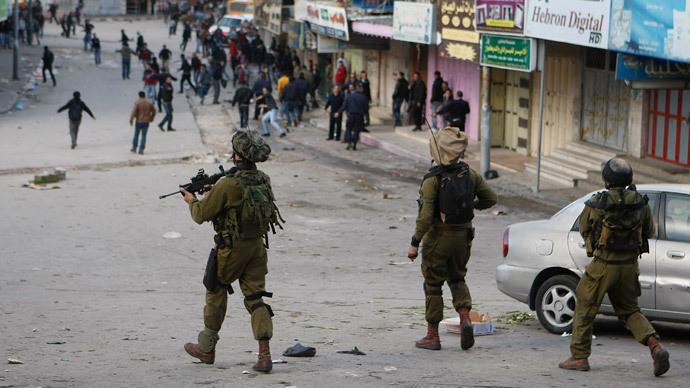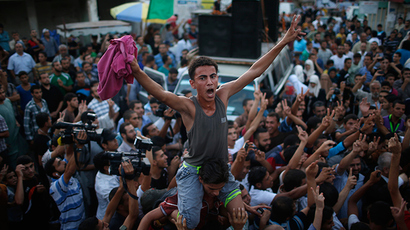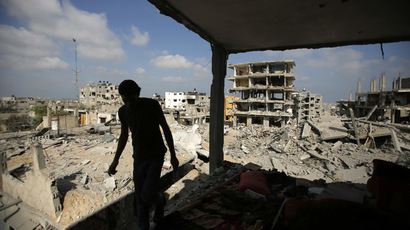IDF intel veterans refuse to operate in ‘occupied Palestine’ - open letter

Forty-three veterans from an elite Israeli military intelligence unit have written an open letter refusing to continue operating in the occupied Palestinian territories, as it is aimed at “political persecution” and not the defense of Israel.
The soldiers from Israel Defense Forces intelligence Unit 8200 – many still on active duty – sent the letter to Prime Minister Benjamin Netanyahu on Friday, explaining that they joined the intelligence-gathering unit believing it would protect the State of Israel and not turn into a machine that works to aid the occupation and create divisions within Palestinian society.
"We, veterans of Unit 8200, reserve soldiers both past and present, declare that we refuse to take part in actions against Palestinians and refuse to continue serving as tools in deepening the military control over the Occupied Territories," they said in the letter, addressed also to the head of the Military Intelligence Directorate and the IDF Chief of Staff.
“It is commonly thought that the service in military intelligence is free of moral dilemmas and solely contributes to the reduction of violence and harm to innocent people. However, our military service has taught us that intelligence is an integral part of Israel's military occupation over the territories."
They also mentioned how, unlike with Israeli citizens, there is virtually no protection of Palestinians from surveillance, nor any limits to it.
The information gathered, they said, “harms innocent people. It is used for political persecution and to create divisions within Palestinian society by recruiting collaborators and driving parts of Palestinian society against itself.”
They explained that it is a decision based on conscience and a realization that continuing to carry out their duties effectively robs millions of their human rights. The letter was also driven by a sense of “urgency and responsibility,” one captain in the reserves, Daniel, told the Haaretz newspaper.
“In the end, I served there for seven years. I believed in what we did there — and for all those reasons, I must take responsibility for what I see as the perpetuation of the cycle of violence. We hope that people will think critically about these things,” he said.

Israel Radio relayed the reaction of Palestinian intelligence. Their spokesman, Adnan Damiri attested to the positive reception of the IDF signatories’ initiative back home, saying that the humanitarian and moral character of their decision was notable and appreciated.
Haaretz also reached the IDF to get some comment on how the letter was perceived.
The official spokesman, explaining the delicate nature of Unit 8200’s work and its central role in protecting Israel, went on to state that “the content of [the unit’s] training places special emphasis upon the fields of ethics, morals and work procedures. These are put into practice during their service as soldiers and officers of the unit, and they are under the constant supervision of commanding officers of various ranks.”
“The concrete claims made in the report are unknown in the Intelligence Directorate,” he said. “The fact that the alleged signatories of this letter contacted the media before bringing their complaints to their commanding officers or relevant agencies in the army is surprising and raises doubts regarding the sincerity of their claims.”
He told the newspaper that harm to innocent civilians is minimized because of a “long and meticulous” procedure for choosing targets, which “take the topic of uninvolved parties into account.”
This is not the first instance that a complaint was publicly filed by the unit’s own members questioning its methods.
According to The Guardian, a decade-old case involved several pilots who refused to take part in targeted assassination missions. This is seen as a very rare case in the Israeli military, where commitment, as well as a desire to extend the service, seems to be commonplace.
Although those involved told the newspaper they were proud of some of the missions inasmuch as they served to defend Israel, they also pointed to how there was also a culture of impunity which frowned upon questioning the legality of any decisions taken and strategies planned by superiors.

This somewhat contrasts with the IDF spokesman’s words to Haaretz.
The servicemen told The Guardian there were “no rules” regarding the procedure for targeting Palestinians for intelligence purposes or to be used as informants.
One soldier, Nadav, 26, told the British newspaper: “In intelligence – in Israel intelligence regarding Palestinians – they don’t really have rights… Nobody asks that question. It’s not [like] Israeli citizens, where if you want to gather information about them you need to go to court.”
“The intelligence gathering about Palestinians is not clean. When you rule a population that does not have political rights, laws like we have, [then] the nature of this regime of ruling over people, especially when you do it for many years, [is that] it forces you to take control or infiltrate every aspect of their life,” Nadav said.
Another added that the perception of Israeli intelligence is full of moral misconceptions and that “what the IDF does in the occupied territories is rule another people. One of the things you need to do is defend yourself from them, but you also need to oppress the population.”
All in all, the idea voiced by the soldiers is that without coercion and repression, there can be no governance. Controlling the population this way is a necessary part of compliance, they explained.














